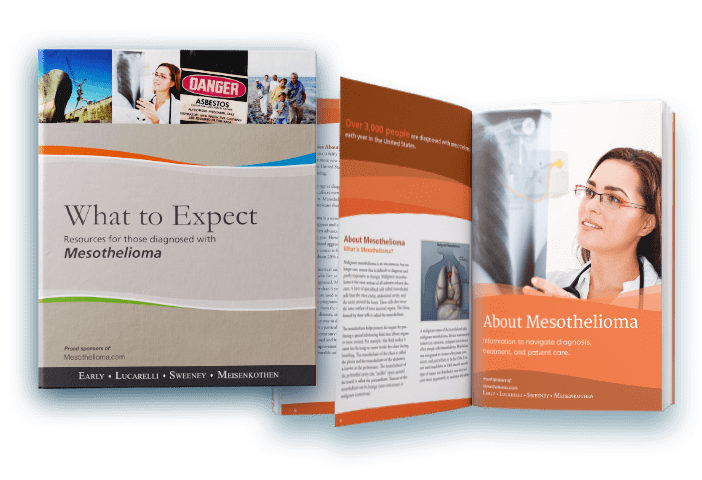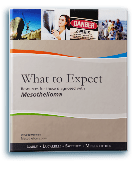
There are certain words in the English language that you never dream of being a part of your every day life—words such as thoracentesis, computed tomography or, how about this one, extrapleural pneumonectomy—EPP for short. All of these words became a part of my every day vocabulary when I was diagnosed with malignant pleural mesothelioma in 2005. We heard the word cancer first. Then mesothelioma. And finally the words extrapleural pneumonectomy.
EPP is a drastic surgical procedure that is used to treat pleural mesothelioma. The procedure involves the removal of the affected lung along with the lining of the chest (pleura), portions of the covering of the heart (pericardium), and the diaphragm.
When I was given the diagnosis of mesothelioma, I was given the choice to have this surgery—a means to extend or possibly save my life and get rid of the cancer. I made up my mind to just go for it.
So many people ask me what it was like to lose a lung, many are people who have been diagnosed and are facing this very same surgery. I will tell you about my experience, in hopes that it will help someone in the same position and help their loved ones understand more of what to expect.
I spent the night before the surgery in the hospital preparing my body for the surgery—lucky me. I got to drink the lovely concoction of Go Lytely™—the same stuff people drink before colonoscopies. Well, I’m here to tell you there is nothing “Lytely” about it. It cleans out your system all right—in record time. After spending the night with the effects of the cocktail, I finally got to sleep around 3:00 a.m. I was woken up at 5:30 to be wheeled down to the pre-op staging area. My nerves kicked into high gear. I did my best to be brave and joke around with the nurses, but the impending seriousness of what laid before me was getting to me.
Plus, I was alone. Cameron had not made it in yet. I kept watching the door for him. It was as if he felt my anxiety because when I looked at the door, he came through it the exact time. I started crying tears of relief that he was there with me. He swept into the pre-op ward, backpack in tow, ready to camp out at the hospital for however long he needed to be there. He whipped out his camera, much to my dismay, and started taking pictures. At the time, I was not happy about it. But, after the fact, I am glad he got pictures to document it. The anesthetist came over shortly and gave me some wonderful drug that took every bit of anxiety in the world away and brought me to my happy place. Before long, I was being wheeled to the O.R. I vaguely remember going through some double doors into the room and it being cold. I made mention of that to the orderly and then I was out.
For the next 8 hours I was in a blissful state. Unfortunately, I can’t say the same for my husband. He was by himself in the family lounge waiting anxiously for updates. About halfway through surgery, Dr. David Sugarbaker came out and spoke with him to tell him it was all going great. They had started the heated chemotherapy wash and, after that, would replace my diaphragm and pericardium with gore-tex. They would then sew me up and send me off to recovery. He breathed a huge sigh of relief and called everyone to tell them the news. A couple of hours later, I came to as they were pulling the intubation tube out of my throat—I was breathing on my own with one lung. I did it! I made it through! I was wheeled into recovery to wait for a bed in the ICU.
I was very groggy and vaguely aware of a lot of tubes and IVs. I was THIRSTY! Terribly, terribly thirsty. I was not allowed to drink anything, but I was given a sponge soaked in ice water. I asked the nurse every 5 minutes for that sponge. I also had a ringing sensation in my ears that wasn’t there before—I found out that the Cisplatin, that they use for the heated chemo causes tinnitus. I spent the rest of the day in that recovery room, watching people coming and going—waiting, waiting, waiting and my wonderful nurse never left my side. Even when her shift was supposed to be over, she stayed with me until I got sent to the ICU. Finally, at about midnight, a bed opened up in the ICU, and I was taken up. My poor husband had been up since 6 o’clock that morning, and never left my side.
It took awhile longer to get hooked up to all the monitors, and IVs, and the nasogastric tube. I had more tubes coming out of me than I thought possible. I had a chest tube, the NG tube, another drainage tube somewhere around my chest, the catheter and then there where the 4 or 5 IV lines—each one delivering a different medicine or being used for blood draws that take place every day.
The doctors don’t mess around with this surgery. They want you up and moving as soon as possible. After the first night, they had me swing my legs off the bed to “dangle”. Then they had me up and sitting in a chair. Every day they would check the chest tube and after a couple of days they were removed. After the 3rd day, the nasogastric tube was removed. Yay! I could now have a liquid diet! I also got up and walked around the ICU a few times a day with the help of a walker that holds the oxygen tanks (which I was still on) and all the IVs. I was finally well enough to move to the step-down unit.
During all this time, I didn’t have much pain; I kept on top of it with the pump. As I got moved to the step-down unit, and eventually my room, I was able to take pain meds orally and no longer on the pump. I slowly got my appetite back and, after a minor setback with my kidneys, I started feeling pretty good, all things considered. Thoughts of certain things were daunting—how could I be a parent to my baby? Would I be able to pick her up and hold her? Would I be able to garden? Would I be active like I once was? Would I be able to go back to work in 12 weeks (THIS makes me laugh now)? When I was finally discharged from the hospital and sent home, I was so happy, but also nervous. I was responsible for myself now. I was surprised at how much I slept, but soon realized healing is work. I was like a baby after getting out of the hospital—I would wake up, have breakfast, and take a nap. Wake up, eat lunch, do something, take a nap. Wake up, eat dinner, watch TV, visit, read, then go to bed. All the while, I was trying to stay on top of the pain and manage it along with the other medication I was on. Before long, I got the go ahead to leave Boston.
I was now starting my new life post-EPP. When I look back, I don’t remember much about it. All I know is that I am an EPP success story. Dr. Sugarbaker often asks me to speak to other patients about my experience and I tell them all in all, it wasn’t bad. There are things I wished I would have done more of—like walking, more exercise and physical therapy, but these are all things I try to do now. I live a full life despite having one lung. The EPP has left an incredible mark on me—literally. The incision I have goes from under my left breast, up around my side to beside my shoulder blade. I call it my battle wound and I am proud of it. I fought mesothelioma with all I had. I sacrificed my lung so I could live a long full life. Was it worth it? Hell yes. I make my life full of quality experiences, despite the pain and the limitations. It is my choice and I chose joy.
Free Mesothelioma Treatment Guide


Heather Von St. James is a 19-year mesothelioma survivor who advocates for patients and a ban on asbestos.

